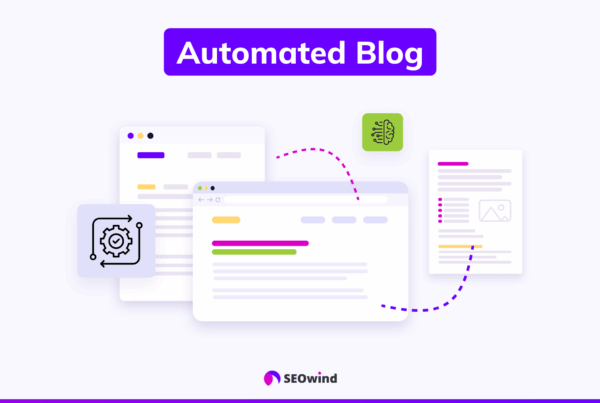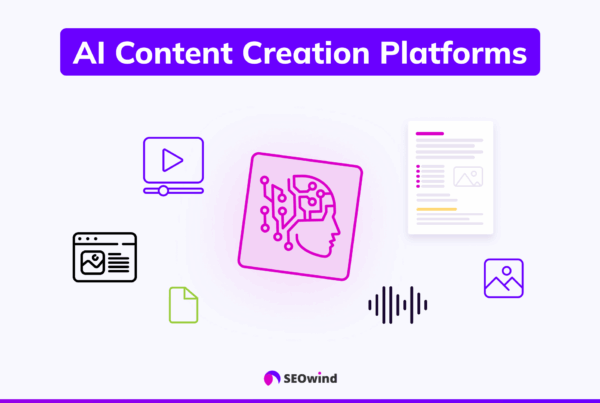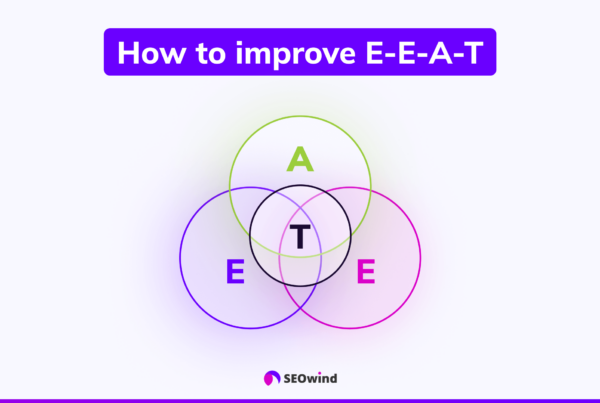AI adoption in marketing has moved from experimental to essential. The momentum continues accelerating. By 2024, a large majority of marketers will use AI tools, with figures ranging from 69% to 85%, depending on the type of AI and marketing function. MarTech reports that 69% of marketers integrated AI into marketing operations in 2024, and 85% use AI writing or content creation tools.
Today’s content creators face unprecedented opportunities and challenges. According to Hostinger, around 56% of business leaders report early or moderate adoption of AI. Content creators who use AI content writing tools report saving time and improving the quality of their output.
Our Research Methodology: How We Evaluated AI Writing Tools
To provide you with reliable recommendations, we conducted comprehensive desk research on each AI content writing tool using a standardized framework that focuses on five key criteria most important to content creators and marketers. Our methodology prioritizes thorough analysis of available information, features, and user feedback to deliver well-informed recommendations.
- Feature Analysis involved reviewing each platform’s official website, documentation, and feature lists to understand their core capabilities. We examined the types of content each tool supports, available templates, customization options, and technical specifications to determine what each platform offers content creators.
- User Experience Research focused on analyzing interface design through available screenshots, demo videos, and user tutorials. We reviewed onboarding processes, navigation complexity, and workflow features, as described in the official documentation and user guides, to understand the learning curve and usability of each platform.
- SEO and Optimization Features were evaluated by examining each tool’s marketed SEO capabilities, including keyword integration features, content optimization tools, and search engine optimization support. We reviewed available documentation on how each platform approaches content optimization and what SEO-related features are included.
- Pricing Structure Analysis involved a detailed comparison of subscription plans, feature limitations, usage caps, and cost-effectiveness across different tiers. We analyzed official pricing pages, feature matrices, and plan comparisons to determine value propositions for various business sizes and content volume needs.
- User Feedback and Reviews were gathered from multiple sources, including G2, product review websites, and community forums. We analyzed user ratings, common praise points, frequently mentioned limitations, and overall satisfaction trends to understand the real-world experiences of users with each platform.
This systematic desk research approach ensures our recommendations are based on comprehensive information gathering and analysis, helping you make informed decisions about which AI writing tool best fits your specific content creation requirements.
Types of AI Content Writing Tools
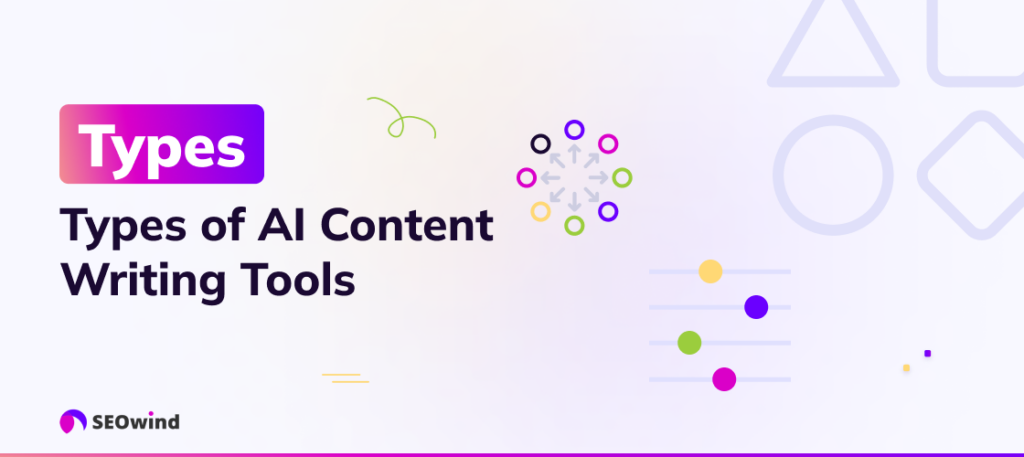
These advanced tools leverage artificial intelligence to create engaging content quickly, efficiently, and accurately. To better understand how these cutting-edge technologies can help enhance your workflow, let’s delve into some of the distinct types of AI writing software available in the market.
We’re going to cover in detail each tool mentioned here in a separate section.
AI Copywriting Tools
AI copywriting tools generate human-like written text that is both coherent and persuasive. These services use natural language processing (NLP) technologies to analyze existing data and create new marketing copy tailored to specific audiences or industries. Some popular examples of AI copywriting tools include:
These platforms can assist with tasks such as writing email campaigns, social media posts, blog articles, or landing pages.
AI Writing Assistant/Proofreading
AI-powered writing assistant and editing platforms not only help you produce content but also offer suggestions to improve its quality by analyzing its tone, syntax, grammar, and structure. Such platforms usually incorporate machine learning algorithms while offering real-time feedback on your writing style. A few notable options in this category are:
By employing artificial intelligence at various stages of the writing process, these sophisticated solutions save time and help you produce polished outputs.
AI Blog Posts and Article Writing Tools
As blogging remains a cornerstone of content marketing strategies worldwide, there has been a rising demand for specialized AI-powered blog writers. Some popular choices comprise:
These versatile applications are capable of synthesizing original articles using advanced language models based on GPT-like architectures. They typically cater to numerous niches spanning technology to lifestyle topics.
SEO-Aware Content Generation Services
With thriving competition in the digital world, maintaining search engine visibility is more important than ever. To help you climb the search engine rankings, AI-driven SEO-aware content generation services optimize your online content by targeting specific keywords relating to your industry. Among the leading tools are:
These software solutions streamline keyword research and enable you to create content that fulfills users’ intent while aligning with search algorithms.
Throughout this overview, we have observed various types of AI article-writing tools, each designed to fulfill specific functions within content marketing strategies. From machine-powered copywriting assistants to intelligent SEO optimizers, harnessing these innovative resources can vastly improve your productivity and output quality.
#1. SEOwind: Best for Data-Driven EEAT Articles

G2 Rating: 4.9
Best For: Marketing teams, agencies, and SaaS companies demanding research-driven, SEO-optimized long-form content with AI-powered automation.
SEOwind isn’t just another AI writing tool. It’s built around a research-first philosophy that flips the script on content creation. Instead of blindly generating text from prompts, it uses AI agents to automate the entire content workflow, from deep SERP and competitor research to drafting, optimizing, and publishing.
Here’s how it works: you enter a focus keyword, and SEOwind’s AI research agent instantly pulls data from top-ranking pages: titles, meta descriptions, word counts, keyword patterns, and clusters-related questions sourced from Google, Quora, and Reddit. This forms rich, data-backed content briefs that feed the AI writing agent, ensuring every article aligns with the proper SEO and user intent targets.
Beyond just writing, SEOwind’s AI workflows streamline quality control with built-in E-E-A-T scoring: Experience, Expertise, Authoritativeness, Trustworthiness, and actionable suggestions to boost credibility and relevance. Managing large content volumes? The platform’s workflow automation can simultaneously spin up multiple briefs and drafts, maintaining quality without manual bottlenecks.
Key features
- AI Article Writer: Generates well-researched, data-rich, and E-E-A-T (Experience, Expertise, Authoritativeness, Trustworthiness) compliant articles using a blend of leading AI models (Claude 3.5, GPT-4o, Gemini 1.5, Perplexity).
- Content Brief Generator: Builds comprehensive, strategy-driven briefs with keyword suggestions, competitor outlines, stats, quotes, and questions based on SERP analysis.
- Keyword Research (SEO Missions): Identifies high-value keywords, content gaps, and opportunities for ranking improvement.
- Content Update Tool: Refreshes existing articles by integrating new keywords, statistics, quotes, and internal links, adapting to current search engine results page (SERP) data for improved rankings.
- Multi-Model AI Deployment: Lets users choose between top AI models (Claude, GPT-4o, Gemini) for each project at no extra cost, optimizing results for specific needs.
- Multi-Agent Workflow: Simulates a human marketing team with AI agents specializing in research, SEO, writing, and editing for more accurate and relevant content.
- EEAT Optimization & Tracking: Proprietary system to strengthen credibility, authority, and trust in content, with actionable suggestions to improve EEAT signals.
- Brand Voice Alignment: Customizes content to match your brand’s tone and style, either by setting guidelines or using auto-generated suggestions.
- Internal Linking Suggestions: Integrates with Google Search Console to recommend and automate internal linking for better SEO performance.
- SERP Analysis: Analyzes top-ranking competitors, extracting outlines, CTAs, and key questions to inform your content strategy.
- AI Humanizer: Transforms AI-generated text to sound more authentic and human, helping content pass AI detection tools and appeal to readers.
- Effortless Editing: Google Docs-style editor with built-in AI prompts for expanding, rewriting, shortening, and humanizing content.
- All-in-One Workflow: From keyword research and brief creation to article drafting and updating, everything is managed within a single platform.
- Automation & Scalability: Automates repetitive content ops, enabling teams to scale production without increasing headcount.
- Real-Time SEO Data Integration: Incorporates up-to-date statistics, quotes, and expert insights directly into content drafts.
Pros
- Slashes manual research time by 60-80%
- The single platform handles end-to-end content ops -no tool-hopping
- Laser-focused on content that ranks well and drives conversions
- Scales seamlessly for high-volume teams
Cons:
- Premium pricing can be tough for small teams
- The community is still growing, so support and the ecosystem is evolving

Pricing:
- Free trial available
- Plans starting from: $49/month
- Enterprise: Possibility of getting custom plans adjusted to company’s needs
#2. ChatGPT: Most Versatile AI Writing Solution

G2 Score: Ranks #3 in Best AI Software Products for 2025
Best For: Writers needing maximum flexibility across content types and use cases
With 400 million weekly active users as of March 2025 and a 62.5% market share among AI assistants (Source: Siege Media), ChatGPT has established itself as the gold standard for AI-powered content creation. Its versatility extends far beyond simple text generation, supporting everything from technical documentation to creative writing.
ChatGPT’s strength lies in its conversational interface and ability to understand context across extended interactions. You can refine outputs through follow-up prompts, request revisions in specific styles, or ask for content adapted for different audiences without starting over. The platform’s training on diverse text sources enables it to generate naturalistic content across virtually any subject matter.
Recent updates have enhanced its capabilities for content creators, including improved factual accuracy, a better understanding of brand voice consistency, and an enhanced ability to work with structured content formats. The tool excels at breaking down complex topics into accessible content and can adapt writing style based on detailed instructions.
Key Features:
- Conversational interface with context retention
- Multi-language support (26+ languages)
- Code generation and technical writing capabilities
- Real-time content refinement through dialogue
- Integration with various third-party applications
Pros:
- Exceptional versatility across content types
- Natural, human-like text generation
- Continuous learning and improvement
- A strong free tier with substantial functionality
- Extensive community and resources
Cons:
- Can generate outdated information (knowledge cutoff)
- Requires careful prompting for optimal results
- No built-in SEO optimization features
- Potential for unfocused output
- No understanding of search intent and keyword context
Pricing:
- Free tier with usage limitations
- Plus: $20 monthly for enhanced features and priority access
#3. Jasper: Best for Team Collaboration and Brand Consistency
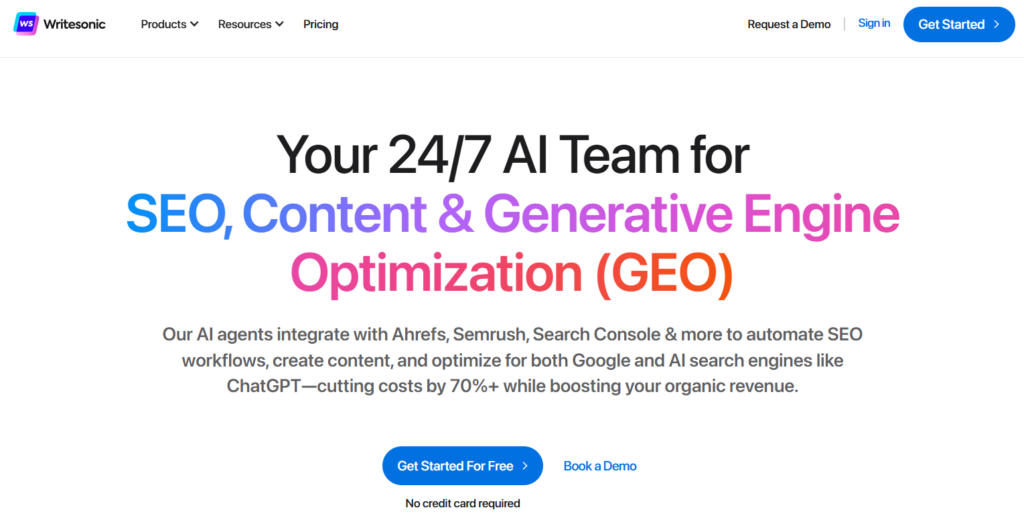
G2 Rating: 4.7/5
Best For: Marketing teams requiring consistent brand voice across multiple content creators
Jasper has positioned itself as the enterprise solution for AI content creation, with particular strength in maintaining brand consistency across team members and content types. The platform’s “Brand Voice” feature learns from your existing content to consistently replicate specific tones, styles, and messaging approaches.
The collaborative features distinguish Jasper from individual-focused tools. Multiple team members can work within shared templates, access approved brand guidelines, and maintain consistency through centralized content “recipes” that standardize formatting, tone, and key messaging elements. This makes it particularly valuable for agencies and larger marketing teams managing diverse clients or product lines.
Jasper’s content optimization goes beyond basic generation. It includes campaign creation features that help develop content series around specific themes, seasonal campaigns, or product launches. The platform also offers performance tracking to help teams understand which content types and approaches drive the best engagement.
Key Features:
- Jasper IQ: A context layer that brings together your brand voice, audience insights, and company knowledge, making every output both personalized and brand-aligned.
- Agents: Jasper features autonomous AI agents for marketing tasks, including SEO optimization, personalization, and deep research, all integrated directly into your workflow.
- Campaigns Suite: Teams can plan, create, and execute end-to-end marketing campaigns from a single dashboard, generating all campaign assets (from blog posts to ads) in a unified brand voice.
- Enhanced Collaboration: Real-time collaboration tools enable multiple users to work on the same content, share templates, and apply centralized style guides, making Jasper highly effective for agencies and large marketing teams.
- Integration Ecosystem: Jasper integrates with key marketing platforms, including Surfer SEO, Webflow, Google Docs, Zapier, and more, streamlining workflows and automating repetitive tasks.
- AI Image Suite: The platform supports on-brand AI-generated images, ensuring visual assets match your brand’s guidelines as closely as the text does.
Pros:
- Industry-leading brand consistency enforcement
- Powerful team collaboration and workflow features
- Extensive template and app library (80+ marketing apps)
- Continuous learning from user feedback and company data
- Expanding integration ecosystem and automation options
Cons:
- Higher cost compared to individual-focused tools
- Advanced features may require onboarding and technical setup
- May be more than necessary for solo creators or very small teams
- Some integrations and campaign features are limited to higher-tier plans
Pricing:
- Creator: $49/month (unlimited words, 1 brand voice)
- Teams: $125/month (3 seats, SEO mode, 3 brand voices, 10 campaigns)
- Business: Custom pricing (advanced analytics, API access, custom templates, dedicated support)
#4. Copy.ai: Best Budget-Friendly Marketing Copy Generator
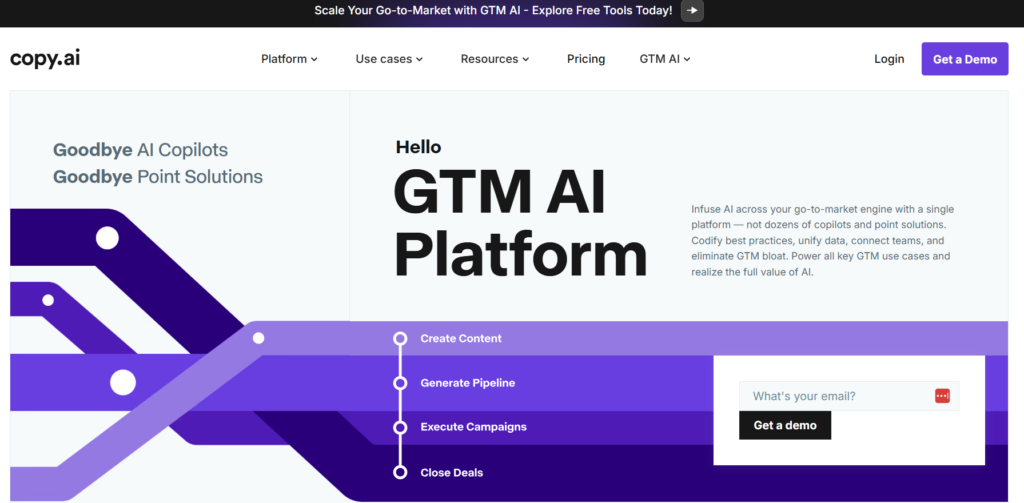
G2 Rating: 4.8/5
Best For: Small businesses and freelancers needing affordable marketing copy solutions
Copy.ai has earned its reputation as the go-to solution for budget-conscious marketers seeking high-quality copy without premium pricing. The platform specializes in short-form marketing content, excelling at email subject lines, social media posts, ad copy, and product descriptions that drive conversions.
What makes Copy.ai particularly appealing is its balance of simplicity and effectiveness. The interface requires minimal learning time, making it accessible to users without extensive AI experience. Despite its simplicity, the platform produces surprisingly sophisticated copy by leveraging proven marketing frameworks and psychological triggers in its output.
The tool’s template library covers virtually every marketing scenario, from cold email outreach to product launch announcements. Each template includes built-in best practices, helping users understand not only what to write but also why certain approaches work better for specific goals.
Key Features:
- Content Capabilities: Copy.ai covers both short-form and long-form content, including blog articles, social media posts, ad copy, product descriptions, emails, and more. The platform supports over 25 languages and adapts to various tones and brand voices, making it suitable for global teams.
- GTM Platform Features: Beyond copywriting, Copy.ai integrates with CRM systems like Salesforce, automating contact enrichment, lead scoring, deal forecasting, and sales process tracking. This positions it as a strategic command center for marketing and sales teams, eliminating workflow silos and improving data accuracy.
- AI-Driven Templates and Workflows: The template library has grown to cover 90+ content types, with industry-specific options and built-in marketing frameworks (AIDA, PAS, etc.). Users can leverage workflow automation for campaign launches, prospecting, and content updates.
- Collaboration and Integration: Copy.ai supports team collaboration, allowing multiple users to co-create, edit, and manage projects. It integrates smoothly with tools like WordPress, Google Docs, Shopify, and Salesforce for seamless workflow management.
- Brand Voice Customization: The platform learns from each user’s writing style and brand guidelines, ensuring consistency across all generated content.
Pros:
- Intuitive, beginner-friendly interface with minimal learning curve
- Fast, high-quality copy generation for a wide range of formats
- Strong focus on conversion-oriented and data-driven content
- Regular updates and template additions
- Deep integration with sales and marketing workflows
Cons:
- Long-form content quality can still lag behind human writers for highly nuanced topics
- Some outputs may feel formulaic with heavy reliance on templates
- Limited customization compared to premium, human-centric alternatives
- Analytics and performance tracking are basic compared to specialized analytics tools
- Editing and revising AI-generated content can be less flexible than manual drafting
Pricing:
- A free tier with monthly word limits
- Pro: $36 monthly with unlimited words
- Enterprise: Custom pricing for larger teams
#5. Writesonic: Best for Speed and Variety

G2 Rating: 4.7/5 from 2,180 reviews
Best For: Content creators needing rapid generation across multiple formats
Writesonic distinguishes itself through speed and format versatility, supporting over 40 different content types, from blog posts to product descriptions. The platform’s pre-trained models enable immediate productivity without the need for extensive setup or training, making it ideal for users who require content quickly across diverse projects.
The tool’s versatility extends to its ability to adapt content for various platforms and audiences. You can generate a blog post and immediately create social media versions, email newsletter content, and ad copy variations, all maintaining thematic consistency while adapting to each platform’s requirements.
Recent updates have enhanced Writesonic’s research capabilities, allowing it to pull current information for more accurate and timely content. This addresses one of the common limitations of AI writing tools while maintaining the speed that makes the platform attractive.
Key Features:
- 40+ content format templates
- Real-time information integration
- Multi-platform content adaptation
- Bulk content generation capabilities
- Built-in plagiarism and grammar checking
Pros:
- Exceptional speed and efficiency
- Wide variety of supported content types
- Easy adaptation between formats
- Competitive pricing structure
- Regular feature updates and improvements
Cons:
- Quality can vary across different content types
- Limited customization for brand voice
- Less sophisticated than specialized tools
- Can produce generic-sounding content
Pricing:
- Free trial with limited usage
- Long-form: $19 monthly for extended features
#6. Claude: High-quality, contextually rich written content for Pros
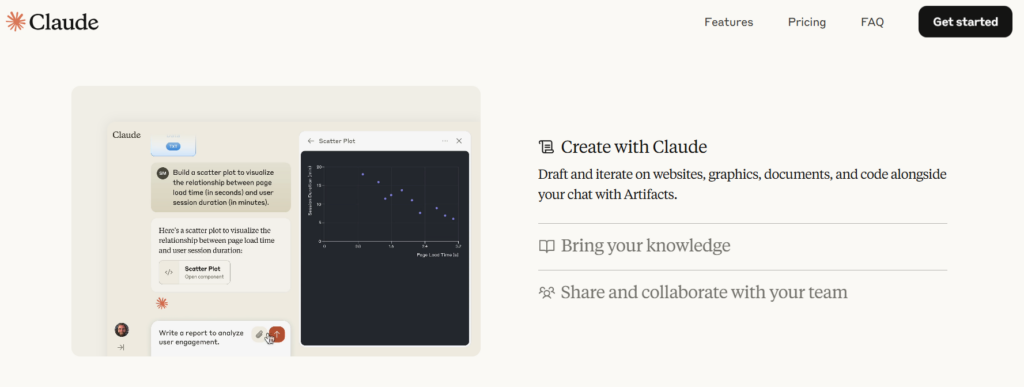
Best for: Content creators, marketers, businesses, and teams seeking a highly conversational, context-aware AI assistant for writing tasks.
Claude is an advanced AI writing assistant developed by Anthropic, designed to generate, refine, and analyze content in a way that feels natural and human-like. It leverages state-of-the-art language models and Constitutional AI principles to provide safe, contextually aware, and creative writing support. Claude stands out for its ability to handle substantial text inputs (up to 200,000 words), making it ideal for summarizing lengthy documents, drafting detailed articles, and managing complex editorial projects. The platform is accessible via the web, iOS app, Slack integration, and API, supporting a variety of use cases from solo writers to enterprise teams.
Features:
- Advanced Text Generation: Produces high-quality, human-like writing for blogs, emails, scripts, and more.
- Contextual Awareness: Maintains coherence and context across long conversations and documents, reducing the need for repeated instructions.
- Content Summarization: Summarizes web pages, PDFs, and other uploaded files efficiently.
- Editing and Optimization: Refines drafts, checks grammar, adjusts tone, and improves clarity based on user feedback.
- Customizable Tone and Voice: Adapts writing style to match brand or personal preferences with provided samples or guidelines.
- Real-Time Collaboration: Allows multiple users to work on projects simultaneously.
- Integration Capabilities: This can be integrated with other software and platforms to streamline content workflows.
- Artifacts Feature: Shares substantial content in a separate window for easier handling of large outputs.
- Secure Data Handling: Prioritizes user privacy and complies with international data standards.
- Continuous Learning: Regularly updates its models for improved accuracy and relevance.
- Code Generation & Analysis: Assists with code snippets, debugging, and technical content creation.
Pros:
- Highly natural and thoughtful writing, often requiring minimal editing.
- Exceptional at retaining context and structure in long-form or complex documents.
- Flexible and customizable, suitable for a wide range of writing needs and styles.
- Strong at summarizing, brainstorming, and providing research support.
- User-friendly interface with easy onboarding and helpful support resources.
- Free and paid plans are available, making them accessible to different user types.
- Strong commitment to responsible AI and content safety.
Cons:
- Limited language support (primarily English), which may restrict the use of non-English content.
- Output quality can vary based on the clarity of the prompt; it may require prompt engineering for optimal results.
- Sometimes, it is overly verbose or lacks depth on highly technical or niche topics.
- Occasional factual inaccuracies – important to review and fact-check outputs.
- Some advanced features require a paid subscription, which may be a barrier for individuals or small teams.
- Potential for occasional crashes or limitations on conversation length.
- Like all AI systems, it may inadvertently reflect biases present in training data.
#7. Grammarly: Best AI Writing Assistant for Quality Enhancement

G2 Rating: 4.7/5 (Named “Leader” and “Best Free Software”)
Best for: Writers seeking comprehensive editing and style improvement
Grammarly has evolved from a simple grammar checker into a comprehensive AI writing assistant that enhances every aspect of your writing process. With its industry-leading rating and extensive user base, it represents the most trusted solution for enhancing writing quality.
Unlike tools that generate content from scratch, Grammarly works alongside your writing to provide real-time suggestions for grammar, clarity, engagement, and delivery. Its AI analyzes your content for tone consistency, readability optimization, and audience appropriateness, making it invaluable for maintaining professional standards across all forms of communication.
The platform’s strength lies in its ability to provide a contextual understanding of various writing scenarios. It automatically adjusts suggestions based on whether you’re writing formal business correspondence, casual social media content, or academic papers, ensuring your tone matches your intent and audience expectations.
Key Features:
- Real-time grammar, spelling, and style corrections
- Tone detection and consistency monitoring
- Plagiarism detection and citation assistance
- Integration with major platforms (Google Docs, Microsoft Office, web browsers)
- Team features for maintaining organizational writing standards
Pros:
- Exceptional accuracy and contextual understanding
- Seamless integration across writing platforms
- Comprehensive free version with core features
- Strong privacy and security protections
- Continuous improvement through machine learning
Cons:
- Doesn’t generate original content
- Premium features require a subscription
- Can be overly conservative with style suggestions
- Limited creative writing optimization
Pricing:
- Free with core grammar and spelling features
- Premium: $12 monthly for advanced suggestions
- Business: $15 monthly per user for team features
#8. Frase: Best for SEO-Optimized Content Planning
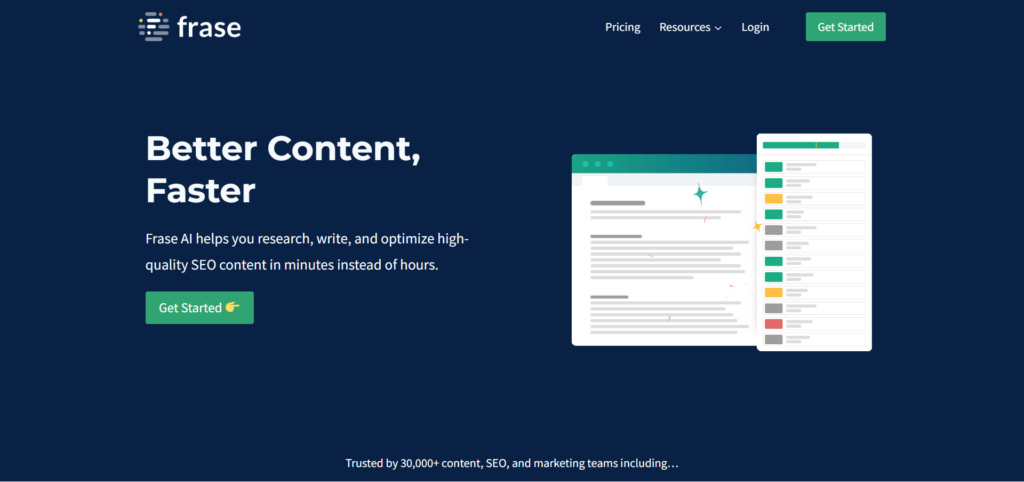
G2 Rating: 4.8/5 from 569 reviews
Best For: Content marketers focusing on search engine optimization and competitive analysis
Frase combines AI content generation with comprehensive SEO research capabilities, making it particularly valuable for content marketers who need data-driven insights alongside quality writing. The platform analyzes top-ranking content for your target keywords. It creates detailed briefs that inform both human writers and the AI generation.
What sets Frase apart is its depth of research (similar to SEOwind). Before generating content, it examines competitor articles, identifies content gaps, and suggests topic coverage that can help your content rank higher. This research-first approach results in more strategic content that addresses user intent while optimizing for search visibility.
The outline generator feature creates structured content plans based on SERP analysis, ensuring your articles cover the topics and questions that your target audience is actively searching for. This strategic foundation significantly improves content performance compared to tools that generate content without competitive context.
Key Features:
- SERP analysis and competitor content research
- AI-powered content brief generation
- Integrated writing and optimization workflow
- Question research and topic discovery
- Content scoring and optimization recommendations
Pros:
- Strong integration of SEO research and content creation
- Data-driven approach to content planning
- Competitive analysis provides strategic insights
- Flexible workflow supporting both AI and human writing
- Regular updates based on search algorithm changes
Cons:
- Steeper learning curve than simple text generators
- Higher cost for full feature access
- Requires SEO knowledge to maximize value
- Limited creative writing capabilities
Pricing:
- 5-day trial available
- Solo: $14.99 monthly for individual users
- Basic: $44.99 monthly with enhanced features
- Team: $114.99 monthly for collaborative features
#9. Rytr: Best for Beginners and Simple Content Needs

G2 Rating: 4.7/5
Best For: New users seeking simple, effective AI writing without complexity
Rytr has carved out a niche as the most beginner-friendly AI writing tool, offering powerful capabilities through an interface that requires minimal learning investment. The platform handles the entire content creation process with minimal user input, making it ideal for those new to AI writing or those who prefer straightforward solutions.
The tool’s strength lies in its balance of automation and control. While it can generate complete articles with just a title and topic, it also allows users to guide the creative process through tone selection, creativity levels, and format preferences. This approach provides beginners with confidence while offering sufficient flexibility for more experienced users.
Rytr’s built-in optimization features, including grammar checking and plagiarism detection, enable even users with limited editing experience to produce professional-quality content. The platform learns from user preferences over time, improving output quality and relevance with continued use.
Key Features:
- Simplified interface with minimal complexity
- Automatic tone and style adaptation
- Built-in grammar and plagiarism checking
- Real-time content editing and refinement
- Growing template library for everyday use cases
Pros:
- Extremely user-friendly for beginners
- Fast content generation with minimal input
- Affordable pricing with a generous free tier
- Continuous learning improves personalization
- Reliable quality across different content types
Cons:
- Limited advanced features compared to premium tools
- Less control over detailed content specifications
- Smaller template library than established competitors
- Basic analytics and performance tracking
Pricing:
- Free plan with monthly word limits
- Saver plan: $9 monthly for regular users
- Unlimited Plan: $29 monthly for heavy usage
#10. GrowthBar: Combining AI Writing and SEO best practices
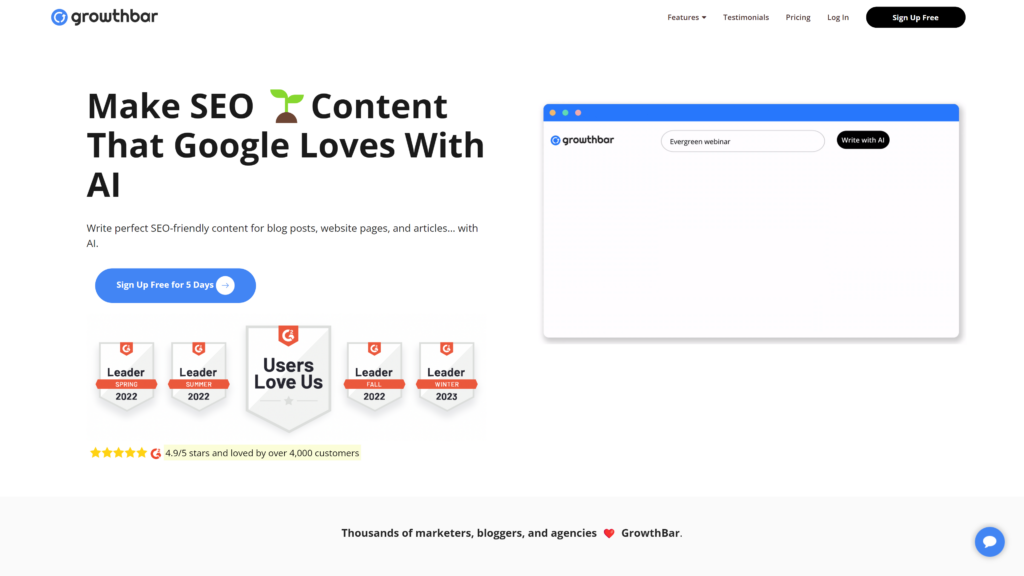
Overview
Unlike the other AI writing tools we’ve covered to this point, GrowthBar isn’t exclusively focused on copywriting. In addition to providing an AI solution to produce content for you, this tool also delivers potent SEO capabilities. That means that not only can you quickly and easily develop content, but the results are optimized to maximize page traffic.
Key features
In addition to writing features such as an AI content generator and a paragraph generator, GrowthBar reviews your linking options. In addition, the tool supports ideation for blog posts and reviews your website for keyword ranking.
Best for
This solution is the best fit for organizations looking to boost both content generation and SEO activity.
Pricing
- Standard: $48 monthly/$29 monthly on a yearly plan
- Pro: $99 monthly/$79 monthly on a yearly plan
- Agency: $199 monthly/$129 monthly on a yearly plan
10+ additional AI content writing tools
AI Writer: A potent long-form AI writer
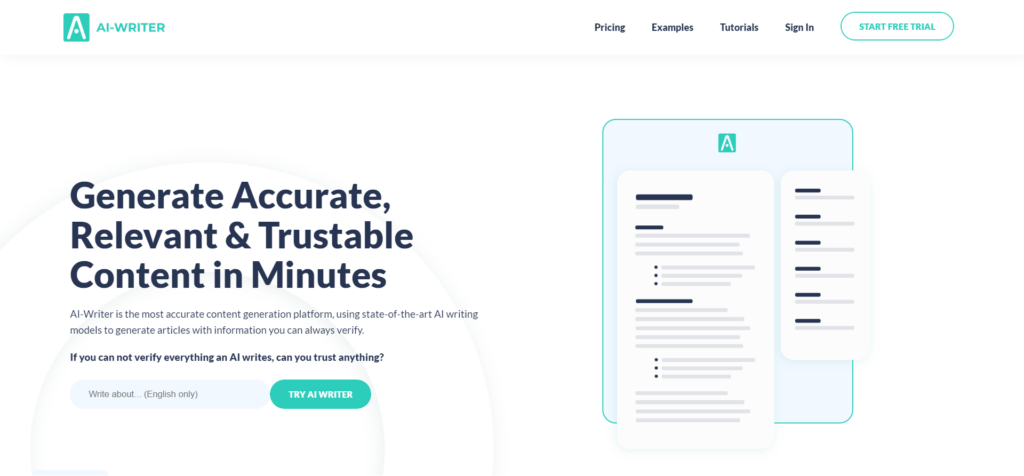
Overview
What AI Writer lacks for subtlety when it comes to its name, it makes up for with writing power. This tool makes creating articles and blogs easier than ever, as you no longer need to do any copywriting yourself. With no more input than a title and a topic, the tool can produce the entire copy itself.
Key features
In addition to providing copy, AI Writer delivers fully sourced content to support everything it writes and save time. The tool also provides a built-in plagiarism checker to ensure that everything it creates is wholly original.
Best for
AI Writer specializes in minimizing the effort required for marketers to create articles and blogs.
Pricing
- 7-day free trial
- Basic plan: $29 monthly
- Standard plan: $59 monthly
- Power plan: $375 monthly
Scalenut: AI commands supporting writing and SEO
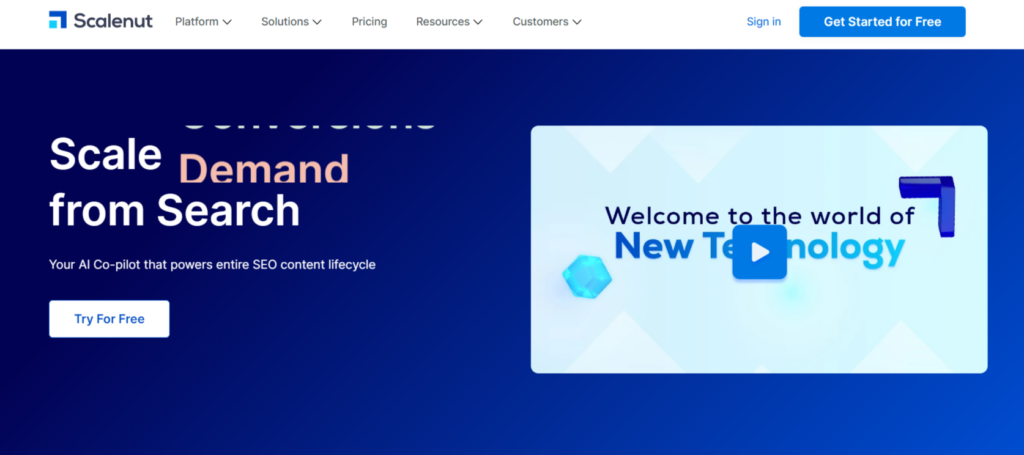
Overview
As with some other options on this list, Scalenut both generates content and provides SEO support. However, in this case, it balances these elements with nuanced editing tools. Rather than using data or a pre-programmed approach, Scalenut asks users to select from different AI Connectors and Operators. These choices then guide the content and influence the final result.
Key features
Built-in SEO features ensure that your content is not only well-written but also primed to perform well on search engines. The tool can support both long- and short-form assets, all of which are driven in part by keyword selection. Finally, Scalenut offers businesses a number of content templates as a basis for their desired content.
Best for
This tool suits veteran marketers who want an all-in-one solution that benefits from greater direct user control.
Pricing
- Essential: $39 monthly/$23 monthly on a yearly plan
- Growth: $79 monthly/$47 monthly on a yearly plan
- Pro: $149 monthly/$89 monthly on a yearly plan
Koala: Content writing based on real-time data
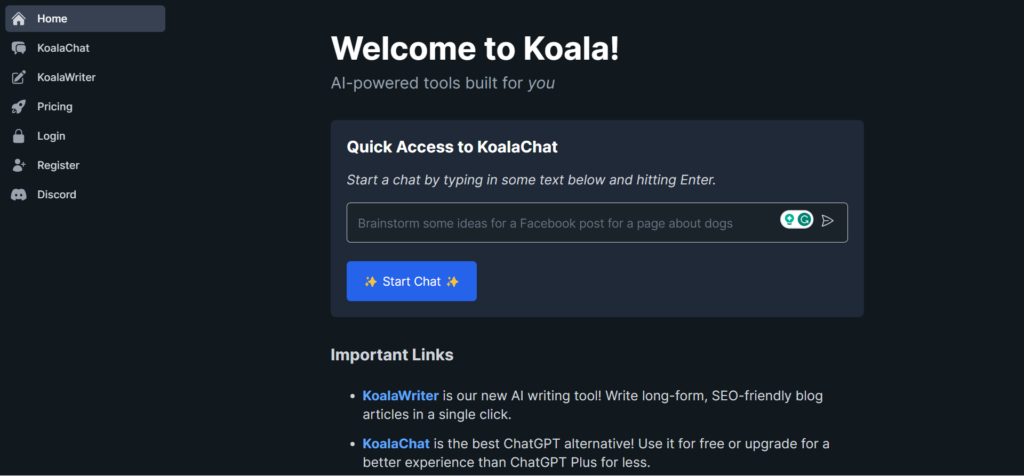
Overview
This AI writing tool utilizes ChatGPT to develop the high-quality content users are looking for. Once you enter the title of a blog post and the voice you want, Koala produces the content.
Key features
While users work with Koala, they can make a decision as to whether or not to add in real-time data. The tool can also include the latest information from the internet to produce up-to-date blogs.
Best for
This is a great option for marketers looking for an easy-to-use and contemporary tool.
Pricing
- Essentials: $9 monthly
- Starter: $25 monthly
- Professional: $49 monthly
Longshot AI: A flexible tool for various content types
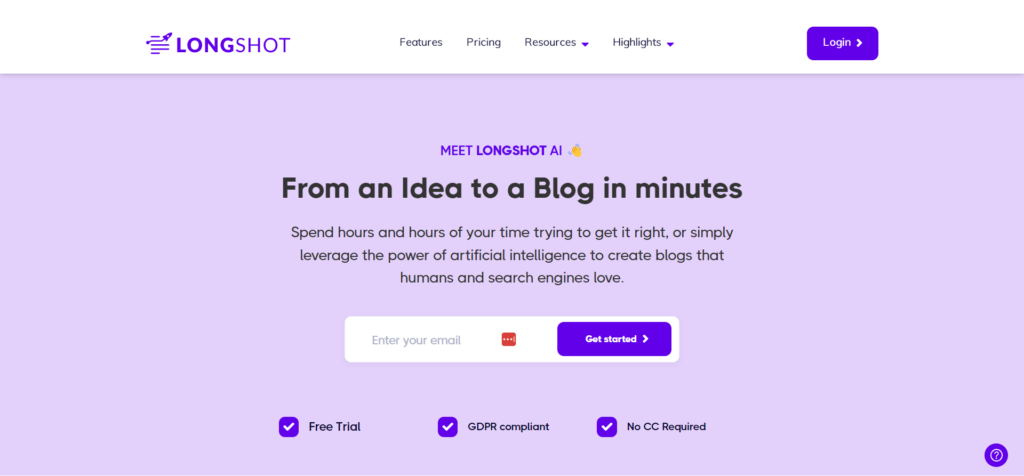
Overview
Longshot uses OpenAI’s GPT-3 model to develop long-form content. This tool provides a variety of writing features, including a content rephraser, synopsis generator, readability improver, and more. Moreover, Longshot AI makes proper topic research easier than ever.
Key features
With its blog templates, Longshot AI guides you through the writing and research process for long-form content. Additionally, this tool offers a fact checker to confirm the accuracy of any material while other features support email writing.
Best for
Longshot AI is a flexible AI writing tool intended to help a broad range of marketers get started with informed copywriting.
Pricing
- Free
- Pro: $29 monthly/$19 monthly on a yearly plan
- Team: $59 monthly/$49 monthly on a yearly plan
- Agency: $399 monthly/$299 monthly on a yearly plan
MarketMuse: Market-leading SEO tool with AI writing support

Overview
One of the most popular SEO tools out there also includes an AI writing component. MarketMuse helps its users to understand what kind of content to write and how to optimize it. But it also can create effective marketing material for you itself.
Key features
In addition to its numerous keyword research features, MarketMuse can also create a brief before writing articles. Users enter a keyword and a url, after which the tool generates an outline that allows for either human or AI copywriting.
Best for
Marketers that want writing support, but are more focused on SEO.
Pricing
- Free
- Standard: $149 monthly
- Team: $399 monthly
- Premium: custom pricing
NeuralText: Uniting keyword optimization and automated writing
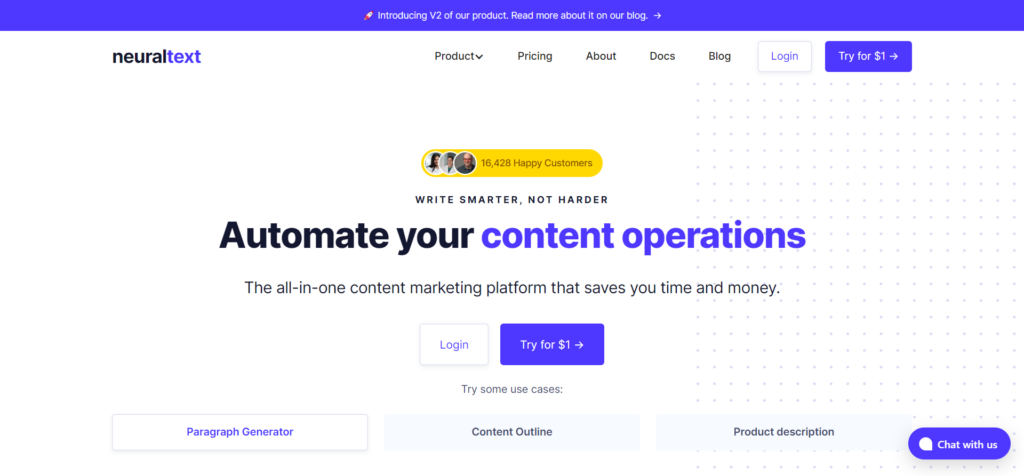
Overview
This platform draws upon machine learning to generate articles based on ideal keyword matches. Neural Text has supported a variety of industries as well as journalists in the development of premium content.
Key features
When producing content, NeuralText’s algorithm automatically searches for the most relevant keyword for your chosen topic. It will then suggest keyword clusters to help maximize the impact of your new article and drive up traffic.
Best for
NeuralText naturally appeals to any marketers looking to develop primarily using keyword optimization techniques as a structural core.
Pricing
- Starter: $19 monthly
- Basic: $49 monthly
- Pro: $119 monthly
Writer: An AI writing tool focused on teams

Overview
In placing its emphasis on supporting teams and businesses, Writer differentiates itself from the field. This tool allows marketing teams to generate on-brand written material that fits their company’s marketing goals and business objectives.
Key features
Writer is a generative writing platform that allows a business to develop its own custom content templates or use pre-existing options. In addition, each organization has the opportunity to train the tool themselves so that its results more effectively suit their particular goals.
Best for
Writer is specifically intended for use by marketing teams looking for a solution that gives them more direct control.
Pricing
- 14-day free trial
- Team: $18 monthly per user
- Enterprise: custom pricing
ZimmWriter: SEO and writing tool with a focus on blogging
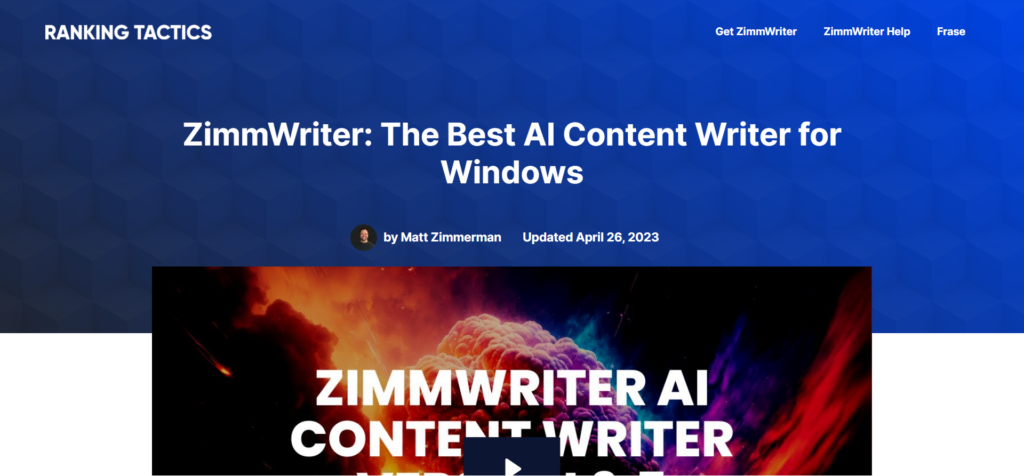
Overview
With its emphasis on generating blog articles, ZimmWriter utilizes a variety of AI writing features to support website owners. To appeal to a broad audience, this tool keeps the process and interface simple and mixes in SEO techniques.
Key features
Natural language processing algorithms ensure that grammar mistakes are caught and corrected. ZimmWriter can apply multiple AI writing options to produce a variety of results depending on each user’s interests.
Best for
Zimmwriter is designed to support website owners and writing professionals.
Pricing
- Normal plan: $14.97 monthly
- Ultimate plan: $29.97 monthly
- Ultimate lifetime deal: $497 one-time payment
5 Best AI writing apps and browser extensions
Grammarly: An application to improve your writing
Overview
Unlike other tools on this list, Grammarly doesn’t write your content for you. Instead, it will follow you through the writing process to recommend grammar, tone, and stylistic improvements.
Key features
Grammarly provides an overlay that tracks every piece of your writing, from emails to articles. It excels at automated proofreading with a contextual spelling checker and other features and can be integrated with Google docs.
Best for
This option is worth considering for any marketer that wants to improve their own writing.
Pricing
- Free
- Premium: $12 monthly
- Business: $15 monthly per user
HyperWrite: A writing assistant for improving your style
Overview
HyperWrite is a browser extension that helps with ideation and stylistic improvements as you write. In addition, the solution provides research, organizational, and editing assistance.
Key features
With more than 50 existing templates, HyperWrite offers formats that help marketers get started. In addition to following along as you write, HyperWrite can also do content creation for you.
Best for
Marketers looking to take a varied approach to content creation will benefit from the suggestions and AI writing of HyperWrite.
Pricing
- Free
- Premium: $14.99 monthly
- Ultra: $54.99 monthly
Paragraph AI: An AI writing app for your mobile device
Overview
Unique among the tools we’ve discussed here, Paragraph AI works primarily as an app on your phone, though it can also be downloaded as a Chrome Plugin. It goes through everything you write to spell check, review grammar, and ensure originality.
Key features
Paragraph AI uses the GPT-3 model for its writing support. On your phone, it seamlessly integrates with your existing writing to provide constant review options.
Best for
Any marketer who works primarily on their phone should take a look at Paragraph AI.
Pricing
- Student: $19.99 monthly/$9.99 on a yearly plan
- Professional: $24.99 monthly/$12.49 monthly on a yearly plan
- Team: custom pricing
QuillBot: AI writing assistance for paraphrasing and citations
Overview
QuillBot is a market-leading writing assistance tool that helps users adjust and paraphrase their own writing. By copying your work into the application, you rapidly obtain rephrasing suggestions.
Key features
QuillBot also works as an extension for Microsoft Word, Chrome, and Google Docs. The tool identifies opportunities to use synonyms, helps to track and properly source citations, and even generates article summaries.
Best for
This is a great solution for writers looking for AI assistance on a reasonable budget.
Pricing
- Free
- Premium: $9.95 monthly/$6.66 monthly on a semi-annual plan/$4.17 on a yearly plan
Wordtune: Simple tool for paraphrasing
Overview
Wordtune provides a browser extension and a document editor for writers looking to clarify their written material. Its AI can review your work to understand the context and then provide specific rewriting suggestions.
Key features
Based on the objectives of your content, Wordtune can help update the phrasing as well as the tone and style. This includes making your content either more concise or expansive while helping to mix up your word choice.
Best for
Wordtune provides an intriguing option for marketers looking to spice up their own written work.
Pricing
- Free
- Premium: $24.99 monthly/$9.99 monthly on a yearly plan
- Premium for teams: custom pricing
Benefits of Using AI Content Writing Tools
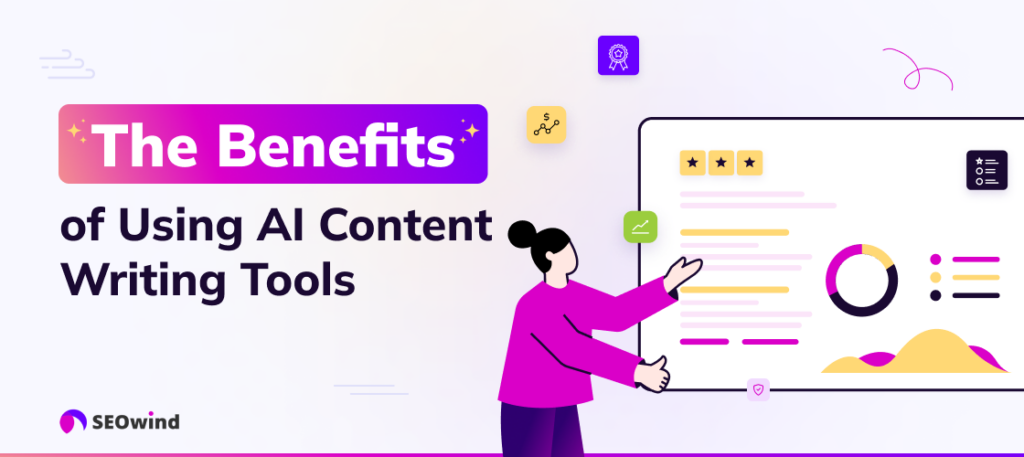
IAI writing tools have seen tremendous growth and adoption among marketers, bloggers, and businesses alike. The use of artificial intelligence in content creation provides various benefits that make the entire process more efficient and productive. Let’s examine some of the key advantages of integrating AI writing tools into your workflow.
Increased Productivity
AI content tools enable you to create high-quality content more quickly than traditional methods. By automating parts or even entire aspects of the writing process, these cutting-edge solutions help to save substantial amounts of time for busy professionals. Consequently, this increased productivity allows you to focus on other vital tasks such as strategy development or business expansion.
Enhanced Content Quality and Relevance
One significant aspect where AI excels is analyzing vast datasets within seconds. This ability enables AI writing tools to research relevant information from an extensive range of sources and deliver content tailored to specific audiences. Advanced algorithms can also generate compelling headlines and keyword suggestions for improved SEO performance, ensuring your message reaches a wider audience organically.
Reduced Dependence on Human Writers
While AI cannot entirely replace human creativity and expertise, it certainly helps bridge gaps when resources are limited or deadlines are tight. Outsourcing tasks such as basic copywriting or drafting blog ideas becomes less necessary due to the efficiency provided by AI-based authors, leading to reduced costs in hiring freelance writers or expanding in-house writer teams.
Ability to Create Large Volumes of Content
For industries that require extensive documentation or frequent publication schedules (e.g., health care, finance), generating large volumes of written materials can be a daunting task for any organization. With AI-powered writing software at your disposal, producing accurate reports or articles with minimal errors becomes significantly easier.
Language Adaptability
Some top-tier AI-writing tools are capable of composing material in multiple languages while maintaining high standards in terms of grammar and syntax accuracy. This feature is particularly valuable for businesses that cater to global markets, as multilingual content creation becomes an achievable goal without the need for individual translators or external language services.
Continuous Improvement
AI writing applications continuously learn and improve based on user feedback, ensuring a steady progression in language proficiency and overall usefulness. By using machine learning techniques such as Natural Language Processing (NLP), these tools consistently develop and tailor their capabilities to serve their users better.
AI writing tools have become indispensable assets for anyone involved in creating written materials for various purposes (although some copywriters are still getting used to this new reality).
By reducing dependence on human authors alone, increasing productivity, enhancing content quality, and providing adaptability across languages, integrating AI into your content strategy can lead to significant long-term benefits for your business or personal writing endeavors.
A practical guide to using AI content writing tools
Dipping your toes into AI content writing might seem intimidatingly complex, but allow me to assure you that it’s not as mysterious as it appears. If you’re a beginner who wants to use this sophisticated technology, let me be your guide on this explorative journey.
Getting started with an AI content writing tool
Our first stop is understanding how to get started. Finding the best AI content writing tool according to your convenience and requirements is quite essential. Here are some straightforward steps:
- Understand your needs: Identify what kind of assistance you need from these tools – be it blog creation, social media posts, or SEO-optimized articles.
- Research extensively about AI in writing: Learn the basic functionalities, strengths, and limitations of several popular artificial intelligence writing tools.
- Choose wisely: Based on your research results, select a tool most closely aligns with your needs.
- Get familiar: Once chosen, explore its interface and unique features before creating real-world content.
- Start small: Create small content to help you learn effectively without being overwhelmed.
Tips for effective use of AI Content Writing Tools

Successfully implementing AI writing tools requires more than simply choosing the right platform. The most productive users develop systematic approaches that maximize AI capabilities while maintaining quality and authenticity in their content.
Start with Clear Objectives and Instructions.
AI tools perform best when given specific, detailed guidance about your goals. Instead of requesting “write a blog post about marketing,” provide context such as target audience, desired tone, key points to cover, and preferred content structure. The more specific your input, the more relevant and valuable the output becomes.
Develop a Consistent Workflow Integration.
Rather than treating AI tools as standalone solutions, integrate them into your existing content process. Many successful creators utilize AI for initial research and drafting, then apply human expertise for editing, fact-checking, and refining their brand voice. This hybrid approach combines efficiency with authenticity.
Leverage Templates and Frameworks Strategically.
Most AI writing tools offer templates for common content types. Still, the most effective approach involves customizing these templates to match your specific brand voice and audience needs. Create your own prompt templates that include your preferred style guidelines, key messaging points, and structural preferences.
Implement Quality Control Processes.
Establish systematic review procedures for AI-generated content. This includes fact-checking statistical claims, ensuring brand voice consistency, verifying that content addresses user intent, and confirming that SEO elements are properly integrated. Consider AI content as a first draft that requires human refinement rather than a finished copy.
Monitor Performance and Iterate.
Track how AI-generated content performs compared to human-written material across metrics like engagement, search rankings, and conversion rates. Use this data to refine your prompts, adjust your workflow, and identify which content types benefit most from AI assistance versus human creation.
The most successful implementation combines AI efficiency with human creativity and oversight, creating a content production system that scales without sacrificing quality or authenticity.
The Challenges and Limitations to Consider

Despite their significant benefits, AI content writing tools come with important limitations that users must understand and address. Recognizing these constraints helps set appropriate expectations and develop workflows that maximize strengths while mitigating weaknesses.
Content Authenticity
Content Authenticity and Brand Voice Challenges remain significant concerns for many organizations. While AI can mimic writing styles, it often struggles to capture the nuanced personality, cultural references, and authentic experiences that make content genuinely engaging. This limitation becomes particularly noticeable in content requiring personal anecdotes, industry-specific insights, or emotional resonance. Many users find that AI-generated content requires substantial editing to sound authentically human rather than formulaic.
Factual Accuracy
Accuracy and Information Currency present ongoing challenges, especially for topics requiring current information or specialized knowledge. AI tools may generate outdated statistics, reference discontinued products, or make claims that sound authoritative but lack factual foundation. This necessitates careful fact-checking and verification processes, particularly for content in regulated industries or technical fields.
Over-Dependence and Skill Atrophy
Risks emerge when users rely too heavily on AI generation without developing their own writing capabilities. While AI tools excel at efficiency, the most effective long-term approach involves using them to augment rather than replace human creativity and expertise. Writers who become overly dependent on AI assistance may find their own creative and analytical skills diminishing over time.
Generic Output and Content Saturation
Generci outputs becomes problematic when multiple organizations use similar AI tools with similar prompts, potentially creating homogenized content that lacks competitive differentiation. Standing out in crowded markets requires combining AI efficiency with unique human insights and perspectives. Content that sounds identical to competitors’ materials fails to establish thought leadership or brand distinction.
Privacy and Data Security Considerations
Privacy considerations vary significantly between platforms, with some storing user inputs for training purposes while others maintain stricter data protection protocols. Organizations handling sensitive information must carefully evaluate each tool’s privacy policies and data handling practices, particularly when creating content containing proprietary information or client data.
Understanding these limitations enables more strategic implementation of AI writing tools, ensuring they enhance rather than compromise content quality and organizational goals.
Common Questions About AI Content Writing Tools
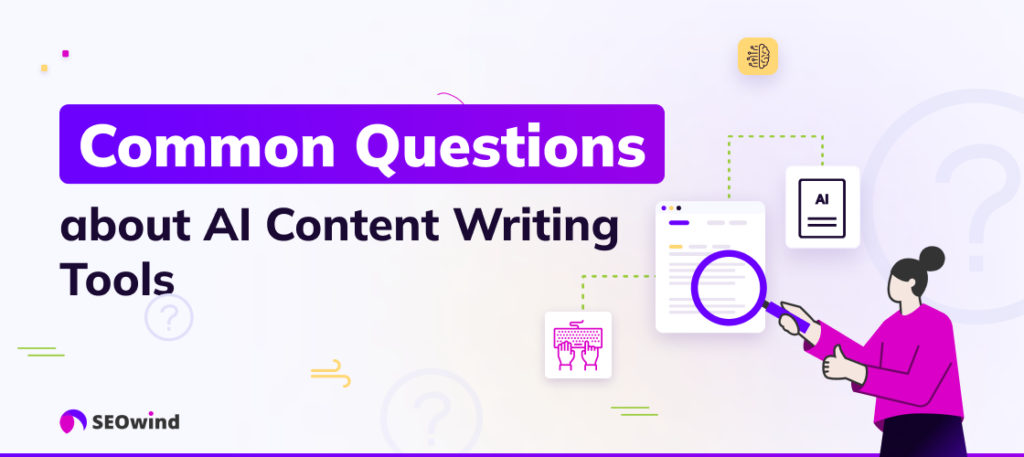
With the growing popularity of AI content writing tools, it is natural to have questions and concerns before investing money, time, and effort into them. Below are some frequently asked questions that potential users often ask.
What is the best AI content writing tool available in 2025?
Several AI article generators stand out for their features, ease of use, and quality:
- SEOwind.io: A powerful AI long-form content writing tool creating articles based on data
- OpenAI’s ChatGPT: The most well-known and powerful language model that can generate high-quality content across a vast range of subjects.
- Jasper.ai: An easy-to-use platform that uses GPT-3 technology with added functionality for content writers.
- Copy.ai: A user-friendly tool designed specifically for digital marketing copy but works for articles too.
- Writesonic: Another GPT-3 based tool with an emphasis on generating engaging blog posts and creating SEO-optimized content.
Remember that what may be considered the “best” may vary depending on individual needs, preferences, and specific requirements.
Which AI writing tool produces the highest quality long-form content?
For research-backed, SEO-optimized long-form articles, SEOwind excels through its data-driven approach that analyzes top-ranking content before writing. Jasper performs well for brand-consistent long-form content across teams. At the same time, ChatGPT offers maximum flexibility for various long-form formats when properly prompted.
How do AI writing tools compare to human writers in terms of cost and quality?
AI tools typically cost $10-$ 100 per month, compared to $ 50-$150+ per article for professional human writers. While AI excels at research, structure, and initial drafts, human writers provide superior creativity, industry expertise, and an authentic voice. The most effective approach combines AI efficiency for drafting with human expertise for refinement and finalization.
What are some free AI tools for content writing?
The best free AI writing tool is ChatGPT. Some tools offer a free option plan:
Keep in mind that free versions usually come with limitations compared to paid subscriptions concerning usage limits or fewer features.
Are AI-generated articles effective for SEO and search rankings?
Yes, when properly optimized. AI tools like SEOwind and Frase specifically analyze search engine requirements and competitor content to create SEO-friendly articles. However, success depends on combining AI generation with human optimization, fact-checking, and unique insights that search engines favor for ranking purposes.
Which AI writing tool is better for content generation?
Comparing different tools requires examining your specific goals because each service caters to varying individual needs:
- For long-form in-depth articles and blog posts, SEOwind is the best option. Their articles are SEO and SERP based, they rely heavily on data to craft the content.
- For versatile projects involving both short and long-content formats, consider Jasper.ai or Writesonic due to their comprehensive capabilities
- For digital marketers who need advertising copy or social media content, Copy.ai may be more suitable
A trial period offered by many platforms can help in determining which solution best fits your workflow.
What should businesses consider when choosing an AI writing tool?
Evaluate your primary use cases (marketing copy vs. long-form content), team size and collaboration needs, budget constraints, required integrations with existing tools, and quality standards. Most platforms offer free trials, making it practical to test multiple options before committing to ensure the chosen tool aligns with your specific workflow and content goals.
Are AI content writing tools worth it?
The decision to consider whether using automated writing tools proves worthwhile heavily depends on individuals’ specific needs:
- Professionals dealing with large volumes of content creation or generating consistent output—such as marketers, content writers, bloggers—are likely to reap significant benefits from these tools.
- Those who require high-quality work from different fields or broader subject areas may find value in bettered solutions leveraging GPT functionality.
- Small businesses that lack dedicated content teams could potentially benefit from automating their process with a longer-term investment perspective.

